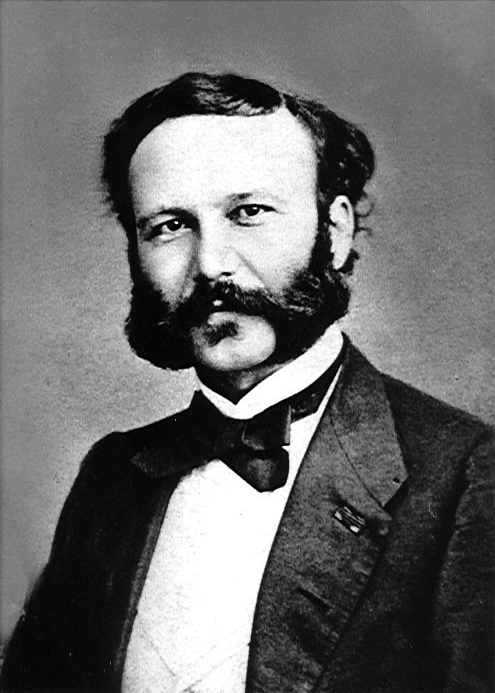
Henry Dunant was born in Geneva on 8 May 1828. Have you heard of the Red Cross? I expect most people have. But you may never have heard of Henry Dunant, who was the force behind the founding of the Red Cross in 1863, the Geneva Conventions, and won the first ever Nobel Peace Prize in 1901. Many people do not know about him because his businesses failed, and he was forced to resign from many committees he was in so as not to taint them. He spent almost the last 40 years of his life living in hiding and poverty. However, without him, we would probably not have the international Red Cross organization.
Henry Dunant was a businessman in the 1850s and he set himself up as the president of the Financial and Industrial Company of Mons-Gemila Mills in Algeria, which was a corn-growing and trading company. He managed to get the rights to a piece of land in Algeria, but he couldn’t secure the water rights. Without water, the land was useless and his company would fail. The land was controlled by France and Dunant decided, rather brazenly, to go and ask Napoleon III directly for the water rights. Napoleon was on campaign, fighting the Austro-Sardinian War.
When Dunant found Napoleon III, he was in Solferino, in northern Italy. Dunant reached Solferino in the evening of June 24th, 1859, just as the battle of Solferino was finishing. It was a battle between the forces of France, led by Napoleon III and the forces of Austria, led by Franz Joseph I. 300,000 soldiers fought in the battle and when Dunant arrived, 40,000 soldiers were lying dead or wounded on the battlefield. There was no system in place to get wounded people off a battlefield and there were no hospitals to deal with them if they could be brought off the battlefield. Soldiers might try to bring back their friends, but there was no way to treat them. It was far more common to go through and retrieve useful kit and weapons.
When Dunant arrived on the battlefield, he couldn’t conscience letting people die, so he mobilized the inhabitants of the nearby time and had them help the wounded. He managed to purchase medical equipment and set up hospitals. He managed to get captured Austrian doctors released so they could help. He persuaded the people to help the soldiers of both sides. He made a huge difference and he helped a lot of people, but it was what he did next that would make a lasting difference.
When he returned to Geneva, he wrote a book about his experiences and published 1,600 copies of it with his own money. In the book, he talked about the problem, but he also offered a solution. He set out the idea for a neutral organization, supported by all of the countries in the world, that could go into battles to help the injured soldiers.
Dunant used his own money to travel around Europe trying to drum up support for his idea. In 1963, the book was made the topic of the Geneva Society for Public Welfare. A committee, including Dunant, was made to work out how to get the program off the ground. Some of the other members didn’t believe an internationally neutral force would be possible, but Dunant didn’t give up. In August 1964, largely due to his efforts, 12 states signed up to the first Geneva Convention. This convention created the Red Cross. It gave people helping the wounded immunity from capture and destruction and it recognized the Red Cross symbol as a way to identify these people. Dunant had created the Red Cross symbol by inverting the flag of Switzerland.
From its beginnings, the Red Cross went from strength to strength. The US signed the convention in 1882, and currently 196 countries are signed up the Geneva Conventions. The Red Cross provides aid and help across the world. Dunant wasn’t a part of this, though, because he was forced to resign shortly after it started. His corn-growing and trading company failed in 1867, leaving him huge debts. He had ignored the running of it to work on the Red Cross and when it failed a lot of his friends lost money as well. He was forced to resign from the International Committee of the Red Cross, the YMCA, and he was forced out of Geneva.
Dunant lived as a beggar for many years, living in Pris. He was often homeless. He ended up in a Swiss village called Heiden. He became ill in 1892 and moved into a hospice, living in room 12. He would have died there, unknown, if it hadn’t been for a teacher in the town who discovered who he was and persuaded him to write a book about his life. He was then found by a journalist in 1895, who wrote an article about him. That article caused the world to remember what he had done, and his work was recognized. He was awarded the first Nobel Peace Prize in 1901. He died in 1910 and May 8th, his birthday is celebrated as World Red Cross Day. He worked hard to make the world a better place for everyone in it. And this is what I learned today.
Image By Unknown author – Internet download, Public Domain, https://commons.wikimedia.org/w/index.php?curid=154887
Sources
https://www.history.com/topics/19th-century/red-cross
https://en.wikipedia.org/wiki/Henry_Dunant
https://en.wikipedia.org/wiki/First_Geneva_Convention
https://en.wikipedia.org/wiki/Battle_of_Solferino
https://www.icrc.org/en/doc/resources/documents/misc/57jnvq.htm
https://www.nobelprize.org/prizes/peace/1901/dunant/biographical/
https://www.pbs.org/wgbh/americanexperience/features/death-then-and-now-death/
